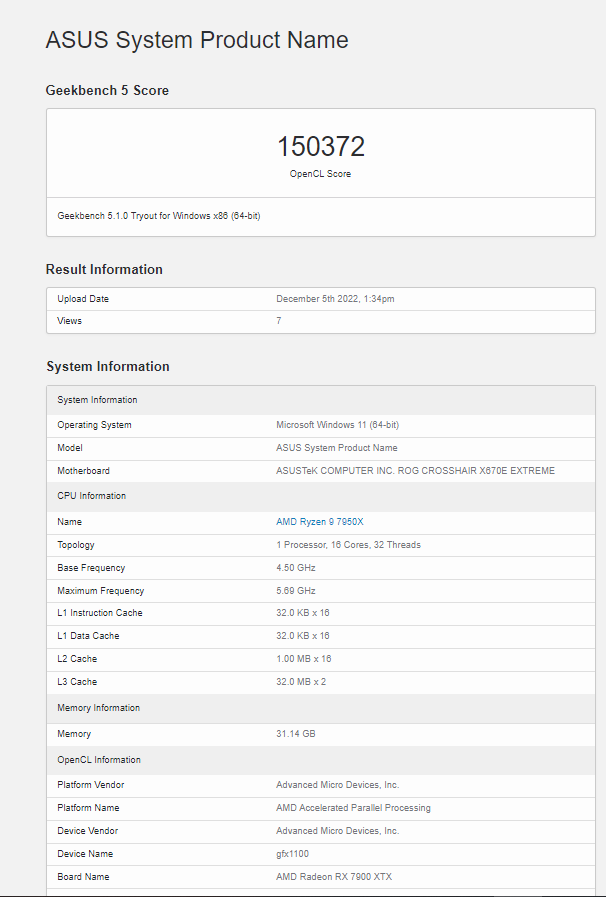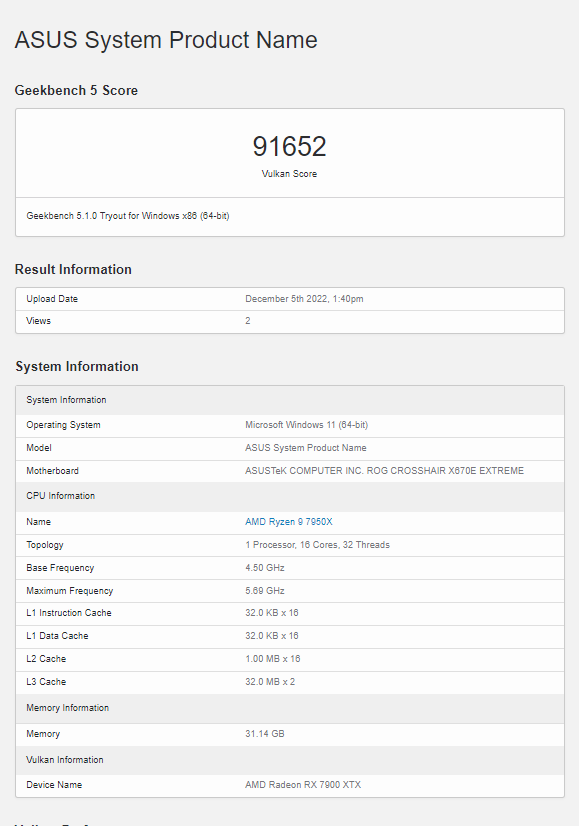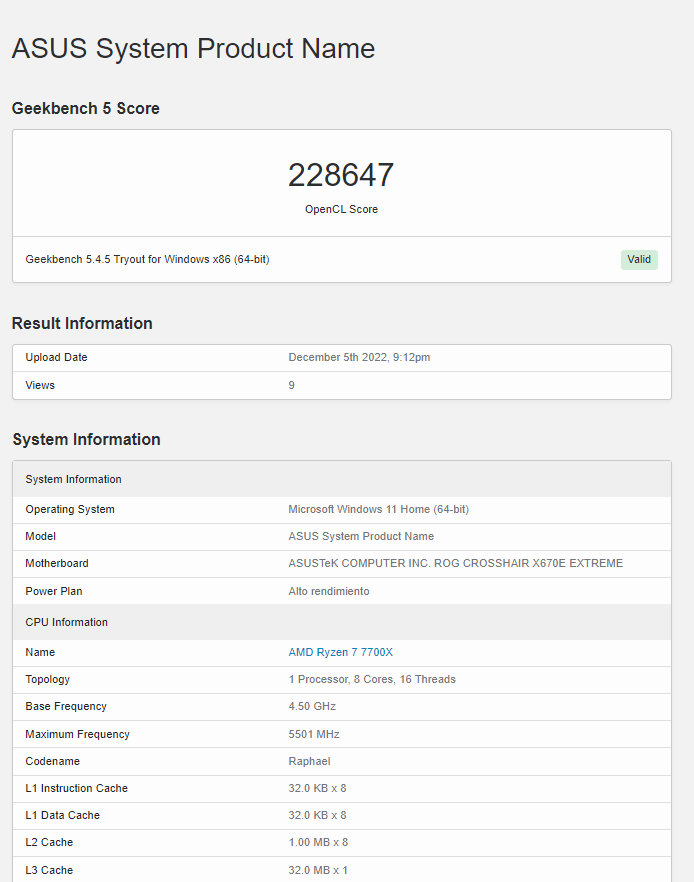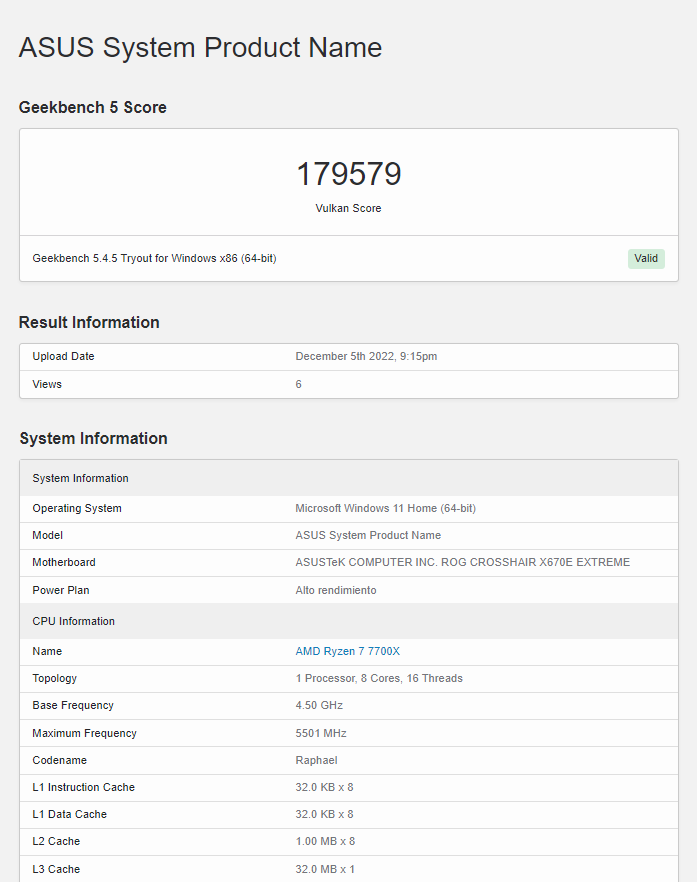RX 7900 XTX Performance
The test bench consists of the Ryzen 9 7950X, 32GB of RAM, and of course the RX 7900 XTX. In OpenCL, the RX 7900 XTX manages to score 150372 points. To put that into perspective, this score is almost 3x less than the RTX 4090‘s 433619 points. If that’s not disturbing, then even the RX 6800 XT attains 155147 points (3% higher). This clearly shows that there is some problem with the drivers used or the test itself. Moving over to Vulkan, the RX 7900 XTX obtains 91652 points. The same test bench is used for this benchmark showing that the source for both these tests is the same. As expected, even in Vulkan the RX 7900 XTX is a huge letdown (or at least the initial drivers are). The RX 6800 XT yet again topples this score by almost 10%.
What Is Going On?
From these results, one can easily conclude that the drivers used are not up to the mark. While that is the case, these GPUs are just 1 week away from launch. We suspect that these tests might have been posted by some reviewer ‘accidentally’. Either way, something along the lines of 30% slower than the RTX 4090 might have been acceptable. But these tests fail to beat even the last generation’s higher-end GPUs. So, based on our observations, either the drivers are faulty/not optimized or something is wrong with these tests. Of course, since AMD has a strong grip on any leak, we can only guess until the reviews go live. All things considered, one should not take these tests as an actual representation of the performance. It is obvious that the RX 7900 XTX will be faster than at least the RTX 4080, so these results are extremely misleading.
Updated Scores
Just now Benchleaks has provided us with more benchmarks of the RX 7900 XTX using the Vulkan and OpenCL APIs. The RX 7900 XTX performs much better now at a comfortable lead against RDNA2 and Ampere, although it still is not able to shine in its true form. The RX 7900 XTX scores 228647 points in the OpenCL test which is a massive 45% faster than the previous test. This score puts it neck to neck against the RTX 3090 Ti. AMD GPUs have had a tendency to score lower than their NVIDIA counterparts in this test. Therefore, against the RX 6900 XT, the 7900XTX is 35% faster. That’s quite underwhelming but being a synthetic test, we expect better in-game results on launch. In Vulkan, a score of 179579 is 95% more than the previous benchmark. This is where the RX 7900 XTX starts to show its true colors. Against the RTX 4080‘s 148838 points, the 7900 XTX is 20% faster. Even the RTX 4090 is in a tight spot being just 5% faster while costing 60% more. We cannot say for sure if the OpenCL test is accurate, however, the Vulkan results are extremely promising. If things go on like this, the RX 7900 XTX could turn out to be a massive challenge for NVIDIA. All in all, only a few days are left since we see RDNA3 in action.
RX 7900 XTX
The RX 7900 XTX is based on the Navi31 chip and ships with 12288 FP32 Units or 48 WGPs (Work Group Processors, 1WGP = 256 Shading Units). The RDNA3 king has 96MB of AMD’s signature Infinity Cache. A 24GB memory configuration (20Gbps) grants it 960GB/s of effective bandwidth over a 384-bit bus. This behemoth is packed with 58B transistors, more than 2x the RX 6900 XT. Proving AMD’s generation-on-generation performance claims, we see a massive 61TFLOPs of compute performance. The average frequency metric termed as ‘Game Clock‘ stands at 2.4GHz. Whereas the base frequencies and boost frequencies are 1.9GHz and 2.5GHz respectively. Team Red really did go all out with these specifications and even then the TDP is rated at just 355W, leagues away from the RTX 4090’s ridiculous 450W figure. The RX 7900 XTX will retail for $999, paving the path for AMD to pull a Ryzen on the GPU market, which is slated for the 13th of December.



